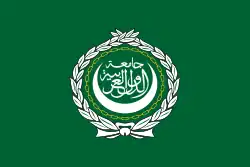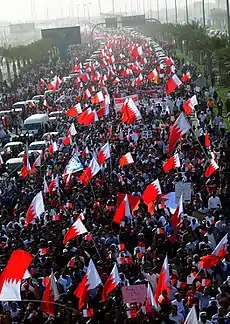Hamad bin Isa Al Khalifa
Hamad bin Isa bin Salman Al Khalifa (Arabic: حمد بن عيسى بن سلمان آل خليفة Ḥamad bin ʿĪsā bin Salmān ʾĀl Ḫalīfah; (28 January 1950) is King of Bahrain since 14 February 2002, after ruling as Emir of Bahrain from 6 March 1999.[1] He is the son of Isa bin Salman Al Khalifa, the previous and first emir. The country has been ruled by the Al Khalifa dynasty since 1783.
| Hamad bin Isa Al Khalifa | |
|---|---|
.jpg.webp) King Hamad in 2017 | |
| King of Bahrain | |
| Reign | 14 February 2002 – present |
| Coronation | 14 February 2002 |
| Predecessor | Position established (Himself as Emir) |
| Heir apparent | Salman bin Hamad bin Isa Al Khalifa |
| Prime Ministers | Khalifa bin Salman Al Khalifa Salman bin Hamad bin Isa Al Khalifa |
| Emir of Bahrain | |
| Reign | 6 March 1999 – 14 February 2002 |
| Predecessor | Isa bin Salman Al Khalifa |
| Successor | Position abolished (Himself as King) |
| Prime Minister | Khalifa bin Salman Al Khalifa |
| Born | 28 January 1950 Riffa, Bahrain |
| Spouse | Sabika bint Ibrahim (1968–present) Sheia bint Hassan Al-Khrayyesh Al-Ajmi 2 others |
| Issue Detail | Salman bin Hamad bin Isa Al Khalifa Abdullah bin Hamad bin Isa Al Khalifa Khalifa bin Hamad Al Khalifa Najla bint Hamad Al Khalifa Nasser bin Hamad Al Khalifa Khalid bin Hamad Al Khalifa Faisal bin Hamad bin Isa Al Khalifa Sultan bin Hamad Al Khalifa Hessa bint Hamad Al Khalifa Nura bint Hamad Al Khalifa Munira bint Hamad Al Khalifa Reema bint Hamad Al Khalifa |
| Arabic | حمد بن عيسى آل خليفة |
| House | Khalifa |
| Father | Isa bin Salman Al Khalifa |
| Mother | Hessa bint Salman Al Khalifa |
Early life and education
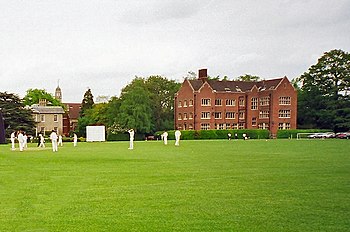
Hamad bin Isa Al Khalifa was born on 28 January 1950 in Riffa, Bahrain.[2] His parents were Isa bin Salman Al Khalifa, then Crown Prince, and Hessa bint Salman Al Khalifa.[3]
After attending Manama secondary school in Bahrain, Hamad was sent to England to attend Applegarth College in Godalming, Surrey before taking a place at The Leys School in Cambridge. Hamad then underwent military training, first with the British Army at Mons Officer Cadet School at Aldershot in Hampshire, graduating in September 1968.[2] Four years later, in June 1972, Hamad attended the United States Army Command and General Staff College at Fort Leavenworth in Kansas, graduating the following June with a degree in leadership.[4]
Crown prince
Hamad was designated as heir apparent by his father on 27 June 1964. In 1968, he was appointed as the chairman of the irrigation council and Manama municipal council. He was commissioned into the Bahrain National Guard on 16 February 1968 and appointed as its commander the same year, remaining in that post until 1969 when he was appointed as the commander-in-chief of the Bahrain Defence Force. In 1970, Hamad became the head of the Bahraini department of defence and the vice-chairman of the administrative council, remaining in both offices until 1971. From 1971 to 1988 he was the minister of state for defence.
In October 1977, Sheikh Hamad started learning to fly helicopters, successfully completing the training in January 1978. He then worked to establish the Bahrain Amiri Air Force,[4] which came into being in 1987 when the defence force air wing was reconstituted as an air force.
Reign

On the death of his father Isa bin Salman Al Khalifa, Hamad became Emir of Bahrain on 6 March 1999.[1] As Emir, Hamad brought several political reforms to Bahrain. These included the release of all political prisoners, the dissolution of the State Security Court and the abolition of the 1974 Decree on State Security Measures. Additionally, many Bahraini citizens were permitted to return after several years in exile overseas.[5] In 2002, he declared himself king. He enjoys wide executive authorities which include appointing the prime minister and his ministers, commanding the army, chairing the Higher Judicial Council, appointing the parliament's upper half and dissolving its elected lower half.[6](p. 15)
Political turmoil

After Hamad took power in 1999, he focused on attaining stability in a nation riddled with profound tensions after the 1990s uprising. The King succeeded in improving the living standards and in making Bahrain a financial hub. During the period 2003–2010 the Shi'ite community accused his government of corruption, discrimination in housing and jobs, recruiting foreigners to the military services and bringing Sunni tribes from Asia to change the demographic composition of the nation.
Although King Hamad's reign has seen the admittance of Shi'ites into positions in the government, there have still been calls for a more equitable distribution of positions and jobs. The Al Khalifa family lead a large number of ministerial and governmental posts including the Ministry of the Interior,[7] Ministry of Justice,[8] the Ministry of Finance,[9] the Ministry of Culture,[10] the Ministry of Foreign Affairs,[11] the Bahrain Economic Development Board[12] and the Supreme Council for Women.[13] Also, the vast majority of significant positions in the Bahrain Defence Force are filled with Sunnis,[14] who account for half of the population.
In October 2010, Hamad's government accused 24 Shi'ite Bahraini citizens of forming a terrorist cell linked to Iran and trained in Syria intending to overthrow the regime, and for planning terrorist attacks. Opposition parties denounced the accusations and described it as propaganda. After a few weeks, tension rose again after the controversial 2010 Bahraini parliamentary election when the main opposition bloc Al Wefaq National Islamic Society with secularist National Democratic Action Society (Waad) complained that the election system was unfair and that there were aims to reduce the number of opposition chairs in the parliament, although the first party won nearly 40% of the available seats.
Bahraini uprising of 2011

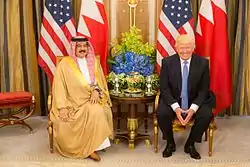
On 14 February 2011, the tenth anniversary of a referendum in favour of the National Action Charter, and ninth anniversary of the writing of the Constitution of 2002, Bahrain was rocked by protests inspired by the Arab Spring and co-ordinated by a Facebook page named "Day of Rage in Bahrain", a page that was liked by tens of thousands just one week after its creation. The Bahrain government responded with what has been described as a "brutal" crackdown[15][16][17] on the protests, including violations of human rights that caused anger. Later on, demonstrators demanded that Hamad step down.[18] As a result of this "massive" crackdown, Foreign Policy Magazine classified him as ranking 3rd out of 8 of "America's Unsavory Allies" calling him "one of the bad guys the U.S. still supports".[19]
On 11 February 2011, King Hamad ordered that 1,000 Bahraini Dinars (approximately US$2,667) be given to "each family" to celebrate the tenth anniversary of the National Action Charter referendum. Agence France-Presse linked the BD1,000 payments to 14 February 2011 demonstration plans.[20]
On 15 February 2011, Hamad apologized for the deaths of two demonstrators in a rare TV speech and urged an investigation into the incident.[6] Two days later, four protesters were killed and hundreds wounded when protesters were attacked in Pearl Roundabout at 03:00 am local time. The Pearl Roundabout was evacuated and encircled by the Bahraini army. Two days later, Prince Salman, Hamad's son, ordered the withdrawal of army troops from there after the death of another protester caused by live ammunition next to Pearl roundabout.
During the peak of the Bahraini uprising in mid March 2011, Hamad declared a State of National Safety for three months just after Salman summoned Peninsula Shield Force troops to enter Bahrain. Saudi Arabia deployed about 1,000 troops with armoured support, and the United Arab Emirates deployed about 500 troops. Opposition parties reacted strongly, calling it an "occupation". Hamad, however, claimed that he deployed the troops to "protect infrastructure and to secure key installations". After this step, the country's economy suffered losses estimated at billions . The security situation deteriorated in areas where people were demonstrating against him. While dozens of deaths were announced, including five who died in custody as a result of torture.
In June 2011, Hamad commissioned the Bahrain Independent Commission of Inquiry, headed by respected human rights lawyer M. Cherif Bassiouni, to look into the events surrounding the unrest. The establishment of the BICI was praised by Barack Obama and the international community[21][22] as a step towards establishing responsibility and accountability for the events of the 2011–2012 Bahraini uprising. The BICI reported its findings in November 2011 and U.S. Secretary of State Hillary Clinton "commend[ed] King Hamad bin Isa al-Khalifa's initiative in commissioning it".[23] In August 2012, Amnesty International stated that "the government's response has only scratched the surface of these issues. Reforms have been piecemeal, perhaps aiming to appease Bahrain's international partners, and have failed to provide real accountability and justice for the victims".[24]
Israel
In August 2020, King Hamad explained to visiting U.S. Secretary of State Mike Pompeo that Bahrain is committed to the creation of a Palestinian state, implicitly rejecting the normalization of ties with Israel.[25] However, on 11 September 2020, it was announced that Bahrain and Israel had agreed to establish full diplomatic relations.[26] On 15 September 2020, Bahrain officially opened state to state relations with Israel, signing diplomatic agreements at a public ceremony at the White House in Washington, D.C.[27]
Good relations with the British court
King Hamad has good contacts with the British royal family. The king was invited by the British court to the wedding of Prince William, but declined amidst protests by human rights activists, who had pledged to disrupt his stay in Britain because of his violent response to demonstrators.[28]
Personal life
Hamad has four wives and has had in total twelve children: seven sons and five daughters:
- He married his first wife (also his first cousin), Sabika bint Ibrahim Al Khalifa, at Rifa'a on 9 October 1968. She is Bahraini and together they have three sons and one daughter:
- Prince Salman bin Hamad bin Isa Al Khalifa, Crown Prince of Bahrain (born 21 October 1969)
- Sheikh Abdullah bin Hamad bin Isa Al Khalifa (born 30 June 1975)
- Sheikh Khalifa bin Hamad Al Khalifa (born 4 June 1977)
- Sheikha Najla bint Hamad Al Khalifa (born 20 May 1981)
- His second wife, Sheia bint Hassan Al Khrayyesh Al Ajmi is from Kuwait. Together they have two sons:
- Sheikh Nasser bin Hamad Al Khalifa (born 8 May 1987)
- Sheikh Khalid bin Hamad Al Khalifa (born 23 September 1989)
- His third wife, a daughter of Sheikh Faisal bin Muhammad bin Shuraim Al Marri, with whom he has one son and two daughters
- Sheikh Faisal bin Hamad Al Khalifa (12 February 1991 – 12 January 2006), died in a car accident.
- Sheikha Noura bint Hamad Al Khalifa (born 6 November 1993)
- Sheikha Munira bint Hamad Al Khalifa (born 15 July 1990)
- His fourth wife, a daughter of Jabor Al Naimi, with whom he has one son and two daughters:
- Sheikh Sultan bin Hamad Al Khalifa
- Sheikha Hessa bint Hamad Al Khalifa
- Sheikha Rima bint Hamad Al Khalifa (born 2002)
Titles and styles
| Styles of The King of Bahrain | |
|---|---|
 | |
| Reference style | His Majesty |
| Spoken style | Your Majesty |
- 28 January 1950 – 16 December 1961: Sheikh Hamad bin Isa Al Khalifa
- 16 December 1961 – 27 June 1964: His Excellency Sheikh Hamad bin Isa Al Khalifa
- 27 June 1964 – 6 March 1999: His Highness Sheikh Hamad bin Isa Al Khalifa, Crown Prince of Bahrain
- 6 March 1999 – 14 February 2002: His Highness Sheikh Hamad bin Isa Al Khalifa, Emir of Bahrain
- Since 14 February 2002 : His Majesty King Hamad bin Isa Al Khalifa, King of Bahrain[1]
Honours and awards
King Hamad has received numerous honours, for example:
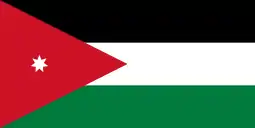 Grand Cordon of the Order of the Star of Jordan (1 February 1967)
Grand Cordon of the Order of the Star of Jordan (1 February 1967)%253B_Flag_of_Syria_(1963%E2%80%931972).svg.png.webp) Order of the Two Rivers, 1st class (Iraq, 22 February 1969)
Order of the Two Rivers, 1st class (Iraq, 22 February 1969)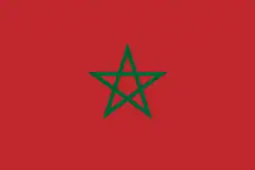 Order of Muhammad (Morocco, 16 October 1970)
Order of Muhammad (Morocco, 16 October 1970) Grand Cordon of the Supreme Order of the Renaissance (Jordan, 1 September 1972)
Grand Cordon of the Supreme Order of the Renaissance (Jordan, 1 September 1972)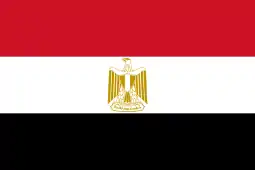 Collar of the Order of the Republic of Egypt (24 January 1973)
Collar of the Order of the Republic of Egypt (24 January 1973).svg.png.webp) Collar of the Order of the Crown (Iran, 28 April 1973)
Collar of the Order of the Crown (Iran, 28 April 1973)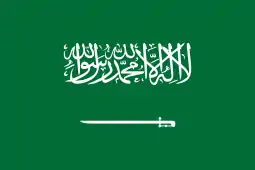 Collar of the Order of Abdulaziz al Saud (Saudi Arabia, 4 April 1976)
Collar of the Order of Abdulaziz al Saud (Saudi Arabia, 4 April 1976)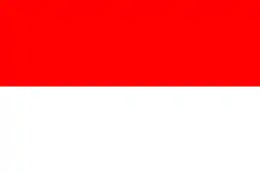 Star of the Republic of Indonesia, 1st class (8 October 1977)
Star of the Republic of Indonesia, 1st class (8 October 1977)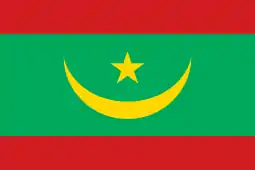 Order of Merit the Republic of Mauritania, 1st class (1 April 1978)
Order of Merit the Republic of Mauritania, 1st class (1 April 1978) Honorary Knight Commander of the Order of St Michael and St George (UK, 15 February 1979)
Honorary Knight Commander of the Order of St Michael and St George (UK, 15 February 1979).svg.png.webp) Order of the Grand Conqueror of Libya, 1st class (1 September 1979)
Order of the Grand Conqueror of Libya, 1st class (1 September 1979) Honorary Recipient of the Order of the Crown of the Realm (2000)[29]
Honorary Recipient of the Order of the Crown of the Realm (2000)[29]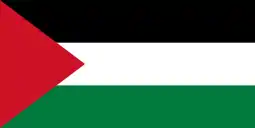 Grand Collar of the State of Palestine (10 April 2017)[30]
Grand Collar of the State of Palestine (10 April 2017)[30]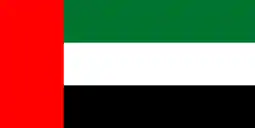 Order of Zayed of the UAE (2 February 2005)
Order of Zayed of the UAE (2 February 2005) Honorary Fellow of the Royal College of Surgeons in Ireland (2006)
Honorary Fellow of the Royal College of Surgeons in Ireland (2006)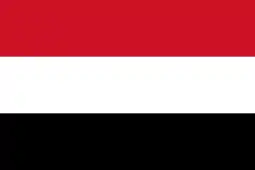 Order of the Republic of the Yemen, 1st class (25 March 2010)
Order of the Republic of the Yemen, 1st class (25 March 2010) Knight Grand Cross of the Order of the Dannebrog (4 February 2011) [31]
Knight Grand Cross of the Order of the Dannebrog (4 February 2011) [31] Grand Cross of the National Order of Merit of France
Grand Cross of the National Order of Merit of France Grand Cross of the Order of Isabella the Catholic of Spain (4 December 1981) [32]
Grand Cross of the Order of Isabella the Catholic of Spain (4 December 1981) [32]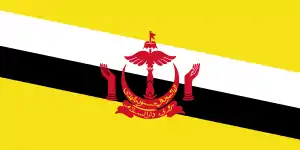 Recipient of the Royal Family Order of the Crown of Brunei (DKMB, 3 May 2017) [33]
Recipient of the Royal Family Order of the Crown of Brunei (DKMB, 3 May 2017) [33]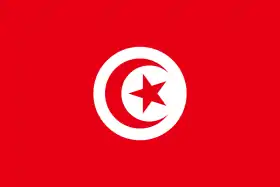 Grand Cordon of the Order of the Republic of Tunisia (27 January 2016) [34]
Grand Cordon of the Order of the Republic of Tunisia (27 January 2016) [34] First Class of the Royal Family Order of Johor (DK I, 26 November 2017)
First Class of the Royal Family Order of Johor (DK I, 26 November 2017) Collar of the Order of the Nile (Egypt, 26 April 2016)
Collar of the Order of the Nile (Egypt, 26 April 2016)
Ancestry
| Ancestors of Hamad bin Isa Al Khalifa | ||||||||||||||||||||||||||||||||||||||||||||||||||||||||||||||||||||||||||||||||||||||||||||||||||||||||||||||||||||||||||||||||||||||||||||||||||||||||||||||||||||||||||||||||||||||||||||||||||||||||||||||||||||||||||||||||||||||
|---|---|---|---|---|---|---|---|---|---|---|---|---|---|---|---|---|---|---|---|---|---|---|---|---|---|---|---|---|---|---|---|---|---|---|---|---|---|---|---|---|---|---|---|---|---|---|---|---|---|---|---|---|---|---|---|---|---|---|---|---|---|---|---|---|---|---|---|---|---|---|---|---|---|---|---|---|---|---|---|---|---|---|---|---|---|---|---|---|---|---|---|---|---|---|---|---|---|---|---|---|---|---|---|---|---|---|---|---|---|---|---|---|---|---|---|---|---|---|---|---|---|---|---|---|---|---|---|---|---|---|---|---|---|---|---|---|---|---|---|---|---|---|---|---|---|---|---|---|---|---|---|---|---|---|---|---|---|---|---|---|---|---|---|---|---|---|---|---|---|---|---|---|---|---|---|---|---|---|---|---|---|---|---|---|---|---|---|---|---|---|---|---|---|---|---|---|---|---|---|---|---|---|---|---|---|---|---|---|---|---|---|---|---|---|---|---|---|---|---|---|---|---|---|---|---|---|---|---|---|---|
| ||||||||||||||||||||||||||||||||||||||||||||||||||||||||||||||||||||||||||||||||||||||||||||||||||||||||||||||||||||||||||||||||||||||||||||||||||||||||||||||||||||||||||||||||||||||||||||||||||||||||||||||||||||||||||||||||||||||
See also
References
- "Country Profiles Bahrain" The Arab Center for the Development of the Rule of Law and Integrity Retrieved 1 December 2010
- "Embassy of the Kingdom of Bahrain to the United States". Bahrain Embassy. Archived from the original on 24 September 2010. Retrieved 2 October 2010.
- "Bahrain mourns death of king's mother". Gulf News. 7 August 2009. Retrieved 6 July 2013.
- "HM the King". Kingdom of Bahrain Ministry of Foreign Affairs. Government of Bahrain. Retrieved 21 February 2011.
- "Bahrain: Promising human rights reform must continue". Amnesty International. 13 March 2001. Retrieved 9 February 2011. Cite journal requires
|journal=(help) - "Bahrain Independent Commission of Inquiry" (PDF). Bahrain Independent Commission of Inquiry. 23 November 2011. Retrieved 23 November 2011.
- "Ministry of Interior". Retrieved 17 March 2013.
- "MoJ Ministers and Undersecretaries' Names". Retrieved 17 March 2013.
- "MoF Welcome Message". Retrieved 17 March 2013.
- "MoC Organisation Chart". Archived from the original on 29 March 2013. Retrieved 17 March 2013.
- "MoFA Organizational Structure". Retrieved 17 March 2013.
- "BEDB Directors". Archived from the original on 21 April 2013. Retrieved 17 March 2013.
- "Supreme Council for Women". Archived from the original on 17 December 2013. Retrieved 17 March 2013.
- "International Religious Freedom Report for 2011" (PDF). U.S. Department of State. Retrieved 17 March 2013.
- Law, Bill (6 April 2011) "Police Brutality Turns Bahrain Into 'Island of Fear' Crossing Continents (via BBC News) Retrieved 15 April 2011
- Press release (30 March 2011) "USA Emphatic Support to Saudi Arabia" Zayd Alisa (via Scoop) Retrieved 15 April 2011
- Cockburn, Patrick (18 March 2011) "The Footage That Reveals the Brutal Truth About Bahrain's Crackdown – Seven Protest Leaders Arrested as Video Clip Highlights Regime's Ruthless Grip on Power" The Independent Retrieved 15 April 2011
- "Bahrain Mourners Call for End to Monarchy – Mood of Defiance Against Entire Ruling System After Brutal Attack on Pearl Roundabout Protest Camp That Left at Least Five Dead". The Guardian. London. 18 February 2011. Archived from the original on 18 February 2011. Retrieved 31 March 2011.
- Uri Friedman (28 October 2011). "America's Unsavory Allies". Foreign Policy. Retrieved 28 November 2011.
- "Bahrains king gifts 3000 every family". France 24. 11 February 2011. Archived from the original on 15 February 2011. Retrieved 28 November 2011.
- Andrew Malcolm (2 July 2011). "Jay Carney says vacationing Obama welcomes new democratic dialogue in Bahrain". Los Angeles Times.
- "Bahrain – Alistair Burt welcomes independent commission". Foreign & Commonwealth Office. 30 June 2001.
- Hillary Rodham Clinton (23 November 2011). "Release of the Bahrain Independent Commission of Inquiry (BICI) Report". U.S. Department of State. Archived from the original on 24 November 2011.
- "Urgent action: Bahraini activist sentenced to three years" Amnesty International 21 August 2012 Retrieved 22 August 2012
- "Bahrain rejects U.S. push to normalise relations with Israel". Al Jazeera. 26 August 2020. Retrieved 26 August 2020.
- "Bahrain establishing full diplomatic relations with Israel, Trump announces". Times of Israel. 11 September 2020.
- "Israel, Bahrain And UAE Sign Deals Formalizing Ties At White House". npr.org. Retrieved 15 September 2020.
- "Hindu, Jain, Sikh, Muslim leaders invited to royal wedding". The Times of India. 26 April 2011.
- "Bahagian Istiadat dan Urusetia Persidangan Antarabangsa". istiadat.gov.my.
- HM King receives Palestinian President
- "Photo". Archived from the original on 2 December 2012. Retrieved 8 April 2016.
- "Boletín Oficial del Estado" (PDF).
- "Borneo Bulletin Online: Sultan of Brunei confers highest state decoration to King of Bahrain".
- علي رجب (27 January 2016). "بالصور.. العاهل البحريني يمنح الرئيس التونسي وسام الشيخ عيسى". بوابة فيتو (in Arabic). Retrieved 25 July 2019.
External links
| Wikimedia Commons has media related to Hamad bin Isa Al Khalifah. |
- The New Amir of Bahrain: Marching Sideways, Abdulhadi Khalaf, Civil Society, Volume 9, Issue 100, April 2000
- "The King's Dilemma: Obstacles to Political Reforms in Bahrain" (PDF). Archived from the original (PDF) on 27 September 2007. (227 KB), Abdulhadi Khalaf, Fourth Mediterranean Social and Political Research Meeting, European University Institute, March 2003
- Generational change and elite-driven reforms in the Kingdom of Bahrain. (Sir William Luce Fellowship Paper No. 7) Dr. Steven Wright (2006) Institute for Middle East and Islamic Studies, University of Durham
- Bahrain: The Royals rule, Le Monde Diplomatique, March 2005
- An Arab exception: Reform in Bahrain The Economist, 29 July 2004 (requires subscription)
Hamad bin Isa Al Khalifa House of Khalifa Born: 28 January 1950 | ||
| Regnal titles | ||
|---|---|---|
| Preceded by Isa bin Salman Al Khalifa |
Emir of Bahrain 1999–2002 |
Became King |
| New title | King of Bahrain 2002–present |
Incumbent Heir apparent: Salman bin Hamad bin Isa Al Khalifa |
